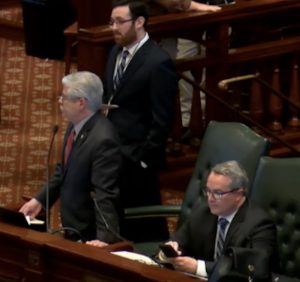State House backs program to cover convention incentives
By Kevin Beese Staff reporter — April 24, 2018
State Rep. Fred Crespo (D-Hoffman Estates) talks on the state House floor in support of a program to reimburse public entities for incentives used to bring convention business to their community. “They have to prove the fact that they generated new business in the state of Illinois,” said Crespo, who sponsored legislation to extend the program until 2022. (Blueroomstream.com)
A program to reimburse municipalities and other public entities for incentives used to draw convention business to their town has been recommended for approval despite one lawmaker contending it handicaps private entities fighting for the same business.
The Illinois House has recommended a two-year extension of the program that allows units of local government, municipal convention centers and convention center authorities to be reimbursed by the state Department of Commerce and Economic Opportunity for expenses incurred in drawing conventions to their venue despite the expenses having taken place in a prior fiscal year.
The program, which was slated to end in 2020, would be extended another two years, if passed by the state Senate.
“It allows municipalities to offer incentives,” said state Rep. Fred Crespo (D-Hoffman Estates), sponsor of the legislation. “… They can only get the incentive paid back if they can prove to DCO that absent incentive they never would have had the business. So they have to prove the fact that they generated new business for the state of Illinois.”
The legislation would affect Schaumburg, Quincy, Springfield, Tinley Park, Peoria, Collinsville, the Quad Cities, Lombard, and the Sports Center in Rockford.
State Rep. Steven Andersson (R-Geneva) pointed out that not every convention center benefits from the incentive-payback program.
“Only certain convention centers benefit because the circumscribed parameters of who qualifies makes it only applicable to a few,” Andersson said. “Tinley benefits from it. Schaumburg benefits from it. Springfield benefits from it. However, St. Charles does not. So the Pheasant Run private center has to compete with these other publicly run convention centers.”
Andersson said he objected to extending the program another two years.
“That’s two more years that my communities and my convention centers can’t benefit from it,” the Geneva representative said.
State Rep. Peter Breen (R-Lombard) noted that the Governor’s Office of Management and Budget was opposed to the legislation “because they believe the bill would undue previous budget management steps.”
“We are always having trouble meeting our budget so I guess there was some thought that they wanted to reduce the amount of spending in this program,” Breen said during House debate on the issue Thursday.
Representatives of the governor’s Budget Office did not respond as of press time for a request for comment regarding their opposition to Crespo’s legislation.
Crespo said the program is revenue neutral because public entities have to prove the money was expended to draw in convention business and that without the incentive the convention business would not have come to the area.
He said municipalities have made incentive commitments to convention businesses and barring the state reimbursement program they are out that money. Crespo said without the state program he doubted if municipalities would offer any incentives to bring in new business.
Crespo said because of the incentive-payback program, Schaumburg was able to attract two new conventions. The expected state paybacks allowed the village to offer “wiggle room” that hooked the businesses, Crespo said.
State Rep. C.D. Davidsmeyer (R-Jacksonville) said the program sounds like a way for convention-seeking public entities to replenish their coffers.
“It sounds to me like somebody wants to spend the money — they are going to spend it anyway — but then they are going to ask the state to reimburse them for money they were going to spend anyway,” Davidsmeyer said.
Incentives are intended to be “prospective,” the Jacksonville representative said. “You are moving forward so I think an after-the-fact reimbursement is completely different,” he said.
The House approved the measure by a 94-14 vote. “No” votes came from Republicans Mark Batinick of Plainfield; John Cavaletto of Salem; Mike Fortner of West Chicago; Randy Frese of Paloma; Brad Halbrook of Shelbyville; Jeanne Ives of Wheaton; Jerry Long of Streator; Bill Mitchell of Forsyth; Reggie Phillips of Charleston; David Reis of Willow Hill; Dave Severin of Benton; Joe Sosnowski of Rockford; Andersson; and Davidsmeyer.
Get your free subscription of the Cook County digital edition
— State House backs program to cover convention incentives . —



